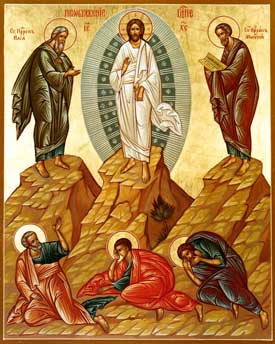Readings: Genesis 15: 5-12, 17-18; Psalm 26; Philippians 3:17-4:1; Luke 9: 28-36

What’s the Transfiguration doing here in Lent? In today’s Gospel we read of that mysterious event when Peter, James, and John witnessed the revelation of Jesus’ divine glory as the Father’s beloved Son, but Lent might not seem, on first appearances, to be the most obvious time to commemorate that particular event in the life of Christ. After all, we usually think of Lent as rather an austere time – wouldn’t the brightness of the divine glory fit rather better with the white vestments of Eastertide than Lent’s sombre purple?
And when you think about it, the question actually goes rather deeper than that; because at a very basic level, the explanation for why we read about the Transfiguration in Lent is that, at least in St Matthew’s account, it’s clear that it happened not long before Christ’s Passion, but that draws our attention to the trickier question of what the Transfiguration itself is all about.
And actually, the timing of the Transfiguration can help us understand this, I think. If it came not long before the terrible events of Christ’s Passion, then we can see it as a glimpse of the glory that would be definitively revealed in Christ’s Resurrection, a “preview”, if you like, to strengthen the disciples and give them hope during the coming troubles: no matter how bad things were going to get, they had seen Jesus arrayed in heavenly brightness talking to Moses and Elijah, and heard as a voice from heaven identifying him as the beloved Son.
And in a sense, hearing the Gospel account of the Transfiguration today has something of a similar role in the course of our Lenten journey. It reminds us of the coming celebration of the Resurrection: if Lent is a time when we remember Christ’s suffering in solidarity with us in our humanity, we know that we will nevertheless celebrate his triumph over death by his divine power at Easter. Likewise, if Lent is a time when we remember our sinfulness, and through our penance recognise our need for God’s mercy, we do so not despairing of our salvation, but always aware of the triumph over sin and death which Christ’s Resurrection reveals.
And that, I think, actually brings out another aspect of what this Lenten season is about. We do, of course, need to focus on different stages of Christ’s life at different times – that’s just how our minds work – we need to spend some time thinking about Christ’s sufferings in order better to celebrate his Resurrection and so on; but Lent is also a time of preparation for Easter in the sense that we remind ourselves what it means to live in the light of the Resurrection.
As St Paul said to the Philippians in today’s second reading, “For us, our homeland is in heaven.” Just as the Transfiguration revealed the truth that, already before the Resurrection, he was truly God as well as truly man – God dwelling on earth among human beings – so we are called to remember at this time that in a certain sense already here and now we share through our Baptism in the Resurrection life, the life with God in heaven which Jesus has made possible for us.

And if we think about the traditional elements of Lenten penance – prayer, fasting, and almsgiving – we can see how this pans out. In encouraging us to pray, the Church is helping us to grow in our awareness of the presence of God in our lives; in prayer, we hold our whole lives – our activities and our desires – in His presence. In fasting – restraining in some way our material consumption – we express our recognition that all the good gifts God gives us are nothing compared to the greatest gift of himself, which he has given us in Christ. In almsgiving, we learn to see Christ in those in need, and also to imitate, in our own small and insignificant ways, that love for mankind which he has shown us.
So, then, the Transfiguration belongs in Lent not only as a reminder of our goal – of the divine glory revealed in the Resurrection – though it does that too. But it also reminds us, helped by our Lenten penance, to see the presence of God in every moment of our lives.
No comments:
Post a Comment